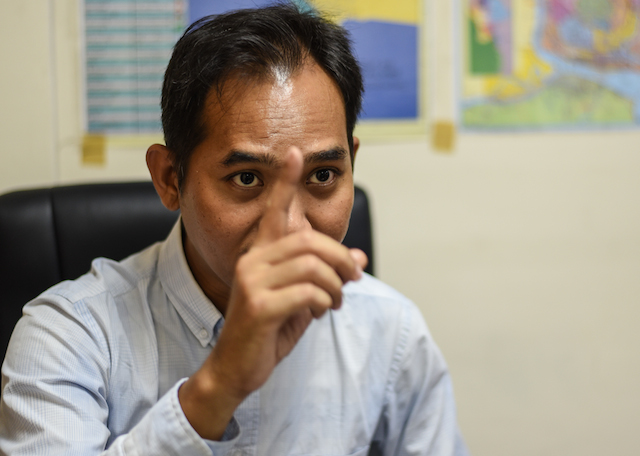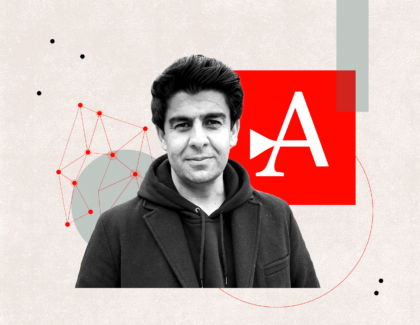Sign up for the daily CJR newsletter.
One day in June, Swe Win, chief correspondent for independent news agency Myanmar Now, walked into a tailor shop in downtown Yangon.
He announced that he was a businessman going to Europe for the first time, and he wanted to order the most expensive suits available.
“The most important thing for me was just to buy time,” the 38-year-old investigative journalist told CJR months later in an interview at his office in Myanmar’s biggest city.
While the colleague who accompanied him made small talk, Swe Win requested a catalog of fabrics. He sat down and pretended to study the samples while clandestinely “throwing my stares” around the shop.
That’s when he saw the girl.
“The first impression is, this is not a daughter,” he recalls. He saw a second girl up close when she emerged from the kitchen. They were both in their mid-teens and dressed in shabby clothes. He saw scars that looked like knife wounds on their hands.
He began to think the tip he’d received the same week–that the owners of the shop had abused two young maids, and kept them in indentured servitude for five years–might be true. He tried to take pictures of clothes in the shop, while also capturing the girls in the frame. One of the shop owners grew suspicious and stood in front of the camera. Swe Win was told not to take photos. With a sense of urgency, he left the shop and did something he hadn’t expected to do when he first went in: he passed along the tip to the police.
Every minute, every second, was precious for these girls.”
“Whether I can write the story or not, it is not important at all. What was important is that the police rescue them as soon as possible,” he says. “Every minute, every second, was precious for these girls.”
He eventually did write the story, and its impact was like nothing he’d imagined. It sparked other stories, all of which detailed a nightmarish scenario. Five years ago, a resident of the girls’ village mentioned that a tailor shop in Yangon, a few hours away, was looking for domestic help. Their parents agreed to send the girls to work there when they were 11 and 12 in exchange for payments back to the family–a not uncommon arrangement in Myanmar and other Southeast Asian countries.
Once there, however, the girls said they were treated like “slaves”: confined in the house connected to the shop, cut off from contact with their families, beaten, burnt, stabbed with scissors, underfed, and not paid. Photos published later showed that one of the victim’s fingers had been broken. The pictures of scars and twisted fingers, combined with a slow response by authorities, seized the country’s attention and turned a local criminal case into national news with far-reaching consequences.
So far, six people have been arrested on human trafficking and other charges, and a shake-up in the police force is underway. Last month, members of parliament voted to take action against a commission involved in the investigation, and on Thursday, four members of the commission stepped down. Meanwhile, Swe Win has emerged as a national hero. For his work, he received a commendation from the president’s office.
The complex saga that unfolded in the three months between the original tip and when Swe Win published his story illustrates the challenges that remain for reporting in Myanmar, where huge gains have been made towards establishing a free press despite enduring restraints within the industry. Swe Win struggled not only to gain confidence in his command of the facts of the case, but worried it might inflame religious animosity, given that Muslims owned the tailor shop and the girls and their family are Buddhist.
Paradoxically, the story also showcases the growing power of the country’s Fourth Estate as it emerges from decades of censorship and military rule. There’s a palpable excitement here about the possibilities of journalism, which is speeding into the digital age, creating a new generations of reporters, raising standards, and opening opportunities to do big, bold stories that were virtually impossible only five years ago.
The story behind the story also offers a window into the soul of one reporter, Swe Win, who started writing news pieces in prison and whose own seven years of suffering shaped the way he approached what became the biggest story of his career.
Like night and day
When you read about Myanmar, you read about political changes. Longtime dissident Aung San Suu Kyi led her party to victory in elections last year. The vote followed four years of surprising reforms by Myanmar’s military-backed leaders, which followed nearly five decades of military rule. Suu Kyi formed a government in March, and in September she traveled to Washington to meet with President Barack Obama, who announced that most of the remaining sanctions against Myanmar would be lifted.
Throughout this period, changes in the media sector galloped alongside political developments. Reforms in 2012 abolished pre-publication censorship, a practice dating to the early 1960s, when the government of newly-independent Myanmar, then called Burma, was overthrown by the military. In 2014, new laws eased rules on licensing and made way for an independent body of journalists known as the Press Council. In this changing media climate, entrepreneurs were allowed to start private daily newspapers. Many did before finding out that print actually cost a lot of money, especially at a time of rising mobile phone usage in Myanmar, which exploded in 2014 as two new foreign telecommunications networks launched, widening internet access and driving down the price of smartphone ownership.
Several of the papers quickly folded, but others rode out the turbulence. New publications jumped into the fray, especially newspapers and online media in regional states with ethnic minorities. Private TV broadcasters are applying for newly available licenses, and in May, CNN signed a deal with TV station Skynet to help create what could become Myanmar’s first 24-hour news network. “With its evolving political environment and new media laws, Myanmar presents a dynamic opportunity for CNN to share its content and values with partners in the market,” Greg Beitchman, vice president of content sales and partnerships at CNN International, told CJR in an email.
Journalists also are experimenting with different storytelling formats. Drones can now be rented and purchased in Myanmar, and news outlets are buying them. Earlier this year, the Associated Press won the Pulitzer Prize in Public Service for its stories on modern-day slavery in Southeast Asia’s fishing industry. One of the four reporters on the team, Esther Htusan, is the AP’s correspondent in Myanmar. She is believed to be the first journalist from Myanmar to win a Pulitzer (Disclosure: I have played table tennis with Esther, and we are part of the same Facebook group called “Ping-Pong Gangster of Yangon.”)
“The exciting thing is now we have a little bit more freedom,” says Thiha Saw, a veteran reporter and executive director of the Myanmar Journalism Institute, which opened two years ago in Yangon. Billed as the first independent, long-term journalism program in the country, it is mainly funded by European NGOs and offers a yearlong diploma program.
Among the most exciting journalistic developments, Thiha Saw told me, is investigative reporting, which was difficult if not impossible before 2012. If it was done inside the country, it involved great risks, pen names, and smuggled footage, similar to efforts today in North Korea. “There were attempts to come up with these investigative reports [in the past], but they were killed under censorship,” he says. “Young people are now ready and willing to go after these kinds of stories.”
Sein Win, a training director at the school, worked in India and Thailand for Mizzima, a Myanmar media outlet that operated outside the country during the military junta, before returning in 2012. “When I started journalism, it was not about journalism. To be honest, I used journalism as a tool, sort of an information campaign to overthrow the military regime,” he tells me. “But for the youth, they have the opportunity to go straight to the professionalism. I believe this is very positive for the country. That’s why guys like Ko Swe Win can do the investigative stories,” he added, using a formal prefix for Burmese male names.
The curriculum includes classes on basic news writing, video, audio, media law, photojournalism, digital media, and feature writing, as well as key coverage areas such as the environment and an upcoming class on gender issues. MJI has partnered with news outlets for internships, and makes trainees head out into the field to report an in-depth story as part of what it calls “summer school.” Sein Win says most students who graduated in the first class in 2015 now have jobs.
He recognizes there are obstacles. “What I don’t like in the current situation is that journalists are overwhelmed by the self-censorship, avoiding sensitive issues,” he says. “But still, we need to investigate, we need to write about that. Luckily, people like Swe Win, they did a great thing,” he adds, saying he was inspired by the reporting. “When I read the story, I wanted to go back to the newsroom.”
Myanmar Now correspondent Swe Win received a commendation from the Myanmar president’s office for reporting that led to the release of two teenage girls. Photo by Aung Naing Soe
To write or not to write
After Swe Win tipped off the police to the alleged maid abuse in June, he repeatedly called asking for updates. He didn’t want to get too entangled, but he wanted to make sure they were doing something because he believed the girls were at risk.
After dozens of calls in which he was told there was “no update,” he upped the ante and contacted Myanmar’s National Human Rights Commission, which was created by former President Thein Sein in 2011. Because of Thein Sein’s ties to the former military government, the commission has power, but lacks credibility. One of its members, for instance, used to be a senior official in the corrections administration, experience that may not translate well to the field of human rights.
The 11-member rights commission is an example of a lingering problem confronting a more aggressive press. Just as the political situation is not as rosy as it looks from the outside–the military still controls 25 percent of the country’s parliament, ethnic armed groups are still fighting government soldiers in some areas of the country, and Suu Kyi has angered many by not taking swift action to help persecuted Rohingya Muslims–the media renaissance has its dark side.
The laws passed in 2014 were supposed to help journalists, but critics say they don’t go far enough in terms of enforcing access to information and protecting the media. Similarly, while the licensing and registration process for media organizations is easier, it could be relaxed even further. An unrelated telecommunications law has led to online defamation convictions for Facebook posts. Moreover there are certain subjects–the military, for instance–where a red line appears to have been drawn, with reporting leading to lawsuits and, in some cases, jail time. In 2014, journalist Aung Kyaw Naing was killed on assignment, reportedly by members of the army.
Everyone cannot be a journalist every moment in their life. I did this out of humanity.”
In the final weeks of July, about a month after Swe Win saw the girls in the shop, local authorities asked him to come in and file an official report. The human rights commission had contacted them. He hesitated, fearing again that he was becoming part of the story. But the police said they could not investigate without an actual complaint. He weighed his choices and filed it. “Everyone cannot be a journalist every moment in their life,” he explains. “I did this out of humanity.”
But, as weeks turned to months with little sign of police action, Swe Win began thinking he should write his story after all. But two concerns made him hesitate. He still didn’t have all the facts, and he saw an undeniable religious element in the case.
Since the country began opening up to the outside world, Myanmar has been dogged by conflict between its majority Buddhist population and its Muslim community, who make up some 5 percent of the population. The conflict has been fueled by a growing Buddhist nationalist movement that often takes to Facebook to fire up emotions over ghastly stories–sometimes invented–of Buddhist women being attacked or sexually abused by Muslim men. They organize protests over perceived slights to Buddhism, and have succeeded in stirring up court cases against their targets. Swe Win knew that because the family who owned the shop was Muslim, Buddhist nationalists might be quick to protest there, stoking tensions (in a twist the hardliners might find inconvenient, the first tip about the abuse came from a Muslim community member).
He also surmised that the police were making progress. They were. Investigators finally looked into the case and produced a report in August. In early September, the girls were released and returned to their village. On Sept. 15, Swe Win was bizarrely invited to a meeting at the human rights commission with the owners of the shop and relatives of the two girls.
The police report, which was summarized aloud at the meeting, described the victims as having been abused for years, tortured, and subjected to “virtual slavery.” The parents say the suspects paid them in the beginning. But after about two years, they stopped hearing from the shop owners. When they visited, they were told the girls had left the house, and that the owners didn’t know where they had gone. The parents filed a complaint with a local township administrator and went back home. Eventually, they gave up on seeing their children again, but the complaint turned out to be important: later, it helped authorities track down the girls’ families.
Recounting the human rights commission meeting, Swe Win seemed angrier at members of the commission than at the alleged perpetrators. One of the commissioners asked the parents if they wanted to take legal action or let “bygone be bygones,” and accept compensation, Swe Win says. Another mused that she had disciplined housemaids before. Swe Win was incredulous. “It’s like a judge in a murder case saying, ‘I also have to murder sometimes!’”
For unpaid wages, damages, and compensation for the girls’ injuries, the parents ultimately accepted about $4,000 from the shopkeeper family. The commission members, four of whom resigned on Thursday amid mounting pressure, first responded to the criticism by saying publicly that they had acted honestly in an attempt to resolve the case.
Swe Win, who says he was warned by the tailor shop family not to write anything, had had enough. After the meeting, he contacted about a dozen other journalists, and on September 17, they all drove the two hours to Kawhmu, where the maids lived. He wanted maximum news coverage, but he also felt personally invested in the case, and thought the presence of other journalists would act as a check on his emotions, giving him more objectivity. On the way there, he explained the whole story to the other reporters. Once in Kawhmu, they interviewed the victims. “I showed them photos [of the shopkeepers] and they told me who tortured them,” Swe Win says.
His story was published on September 19, along with several others. The arrests, the parliamentary vote, and a presidential inquiry all followed within days. The fate of the police who initially failed to investigate is not yet known, but the rights commission resignations could be a sign of things to come. A sixth suspect turned herself in late last month, but it remains unclear how many members of the family knew about the abuse or participated in it.
Reporters including Swe Win omitted the religious affiliation of the alleged abusers from their stories, but it became widely known after police posted the suspects’ photos and names on Facebook. So far, there have been no protests.
A world view
In the US, journalists praise objectivity and keep a certain distance from the people they write about. But in Myanmar, the situation is more complicated. That doesn’t mean journalists don’t strive to be objective and fair, but in a country that has fought so long for the rights others take for granted, the news can feel far more personal. Reporters in the West often have little in common with the subjects of our stories. That was not the case with Swe Win, whose way of thinking was forged through years of disappointment and survival.
In the 1990s, Swe Win was a kid living on the outskirts of Yangon. One day he was tricked into working for a foreign company in the city. He thought he was volunteering, just helping out; only later did it occur to him that he should have been paid. The experience lasted only a day, but the sense of unfairness made a lingering impression. “Our labor was exploited. But we were young, we didn’t know about the world, how the world works,” he says.
When he was a teenager, he read Shakespeare and wanted to be novelist, but Swe Win was also a news junkie. He listened to the radio and hunted down newspapers at a time when they were not widely available. He thought about joining a state-backed paper just to learn the basics, like layout and editing. He was also, like many people his age at the time, involved in politics as a pro-democracy activist and supporter of Aung San Suu Kyi, then still a dissident working against the military. After he distributed pamphlets calling for the downfall of the military government, agents burst into his house in the middle of the night and arrested him. The 20-year-old was sentenced to 21 years in prison.
What the two girls went through in the tailor shop reminded him of what he’d endured in prison and under the junta.
“I have been violently beaten up in my life during military rule. The interrogation center, in the prison, I had been violently abused. I was taken to an open field, and then a group of 10 people violently beat me,” he says. “All the abuse in which the girls were subjected to, every stroke, every hit, is something I take deeply personal,” he adds. “They were in prison in the house. I also was a prisoner.”
After going to sleep in his cell, he would have a recurring nightmare. His house was raided, just as it had been in real life, but in the nightmare he managed to escape. He kept running, trying to evade a group of people he described as “hound dogs pursuing me.” He dived into a pond to hide. Thinking the coast was clear, he emerged from the water and looked for shelter in one of the nearby houses. He knocked on doors but no one answered. The doors were all locked. “And then I was caught and then I opened my eyes and then woke up from my nightmare and then saw the bars of the cell,” he says.
When he interviewed one of the girls years later, she said she had escaped in the middle of the night and ran down the street asking for help, but couldn’t find anyone. She was caught, hauled back to the house, and beaten.
Two years into his prison sentence, the authorities gave him a pen and paper. He created his own newsletter and circulated it among fellow inmates. He wrote hard news, essays, and opinion pieces. There were also human-interest features about drug addicts, murderers, rapists, and warlords.
“I wrote just news style, you know, ‘Prison Superintendent Chief said,’” he recalls, laughing at the memory. “You have a lot of sources, you know! You have very interesting stories in the prison, a lot of cases, fresh cases.”
After seven years, he was released in 2005 as part of a government amnesty for prisoners, political and otherwise. In 2006, he started writing for a few journals–as many weekly newspapers were called here–and then did an internship with the Myanmar Times. He studied journalism at the University of Hong Kong, and afterwards worked for the Irrawaddy, one of the Myanmar media outlets that operated outside the country to avoid censorship and returned after the reforms. He did some consulting and freelanced for The New York Times.
The digital-only Myanmar Now, funded by Thomson Reuters, launched in 2015, and he joined the organization. The timing was good. Election season was getting under way, and the team published several hard-hitting stories, including an investigation into a group of government-backed thugs, a Buddhist nationalist school, and prison labor camps.
Paying the real price
At a short preliminary hearing for the tailor shop owners on September 29, the chamber at the Yangon western district courthouse was full of journalists. The family who owned the shop was brought in in handcuffs: an older man, his wife, their two daughters, a son, and a son-in-law. The older woman had to be helped by police officers.
The previous day, one of the daughters–the latest suspect to come forward–had written on Facebook that she was innocent but was turning herself in anyway. She posted a photo of herself with her two children, whom she said had no one to look after them. Swe Win was saddened by the post, but wrote on his own Facebook page later that the woman had been in the shop when he first visited posing as the businessman, and while he didn’t believe she had personally abused the girls, she was the one who’d blocked him when he tried to take photos.
The hearing lasted five minutes, and a new date was set for the next appearance. The suspects were led from the courtroom, and the media moved outside. When the authorities backed a vehicle right up to the doors of the courthouse, trying to take the suspects back to prison without their being seen, photographers tried to take pictures by crouching under the belly of the truck.
Swe Win’s own background made him feel a twinge of guilt about the tailors potentially going to prison. He knows the pain of confinement. The realist in him grasps the unsettling truth that we are all capable of doing very bad things. On the other hand, he told me, “if you are wrong, you will have to pay a price.”
Has America ever needed a media defender more than now? Help us by joining CJR today.







